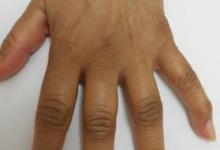ICYMI: What to do about pre-clinical RA? Save

Editor's note: This article originally appeared March 20, 2023 following RheumNow Live 2023. We're sharing it again as we highlight lectures from Pod 1: Rheumatoid Arthritis - Revolutionary Advances in Therapy this week during Tuesday Night Rheumatology. Join us!
Much like the recent ACR Convergence, RheumNow Live’s 2023 conference led with this year’s hot topic of rheumatoid arthritis and especially what to do regarding pre-clinical RA.
Dr. Kevin Deane started the discussion Saturday morning by mapping out a very complex course of RA, beginning with a person’s genetic and environmental risk factors. In that sequence of events, local and systemic factors have a role including the presence of RF and ACPA, as well as possible mucosal presence of ACPA. This phase is commonly referred to as non-articular RA. Despite the absence of arthralgia, some patients can experience other symptoms such as fatigue and malaise.
After this stage, some patients can progress into a subclinical phase that may not present with arthralgia, but imaging evidence of joint inflammation may be present without objective synovitis findings on physical exam. The initial presentation of articular RA may not be classic or textbook, as patients present with oligoarthritis, which may not be symmetrical. Finally, these patients can often progress to classic RA with eventual bilateral polyarthritis.
The question we all face in the clinic is what to do with a patient who is CCP positive who is asymptomatic? What do we tell the patient? Are there any drugs we can offer to prevent RA altogether? A statistic I find helpful is that if someone is CCP positive, there is a 20-30% risk for clinical RA in the next three to five years as well as a likelihood for a higher risk for over five years. One should also be aware that risk can increase to up to 80% based on additional factors such as symptoms, other antibodies, and imaging findings.
There have been multiple trials looking at preventing RA with medications such as rituximab, abatacept, hydroxychloroquine, and methotrexate and thus far, none have proven sustained efficacy in preventing RA, especially if the drug is stopped.
What are Dr. Deane’s recommendations for management of pre-RA patients?
I think it is similar to what we’ve all been doing either consciously or subconsciously. First, one should carefully evaluate for synovitis during a physical exam. We know certain lifestyle factors, especially smoking should be avoided. Other considerations should include a healthy mixture of exercise and maintaining a healthy weight. The benefits of specific diets such as a mediterranean diet are currently being studied. There have also been questions regarding periodontal health and its linkage to RA. It would be safe to say most rheumatologists recommend and advocate for a healthy dental hygiene routine. It is also important to educate the patient on the risk and prediction of RA in CCP positive patients and thus the importance of follow up. Finally, Dr. Deane recommends at least annual in-person follow ups to monitor for change in symptoms. These are certainly recommendations I currently follow and will continue to follow in this patient population as we learn more in the years to come.











If you are a health practitioner, you may Login/Register to comment.
Due to the nature of these comment forums, only health practitioners are allowed to comment at this time.